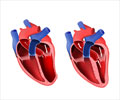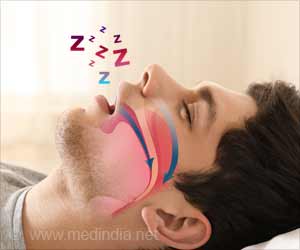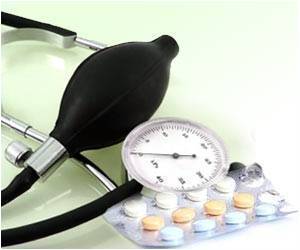For high-blood-pressure patients, preventing or reducing enlarged heart, left ventricular hypertrophy, reduces risk of atrial fibrillation.
For high-blood-pressure patients, preventing or reducing enlarged heart (left ventricular hypertrophy, LVH) reduces risk of atrial fibrillation (AF or afib), a life-threatening condition that can lead to stroke and heart failure.
An estimated 20 percent of all high-blood-pressure patients, or 12 million Americans, have LVH and are at increased risk of developing AF.While the direct relationship between levels of LVH in patients with high blood pressure and risk of cardiac complications -- including death, heart attack and stoke -- has previously been demonstrated by NewYork-Presbyterian/Weill Cornell researchers (JAMA, 2004), the new study is the first to demonstrate that prevention or regression of LVH reduces risk of AF -- and that this relationship exists independent of therapy type and the benefits of blood pressure lowering. Both studies used data from the Losartan Intervention for Endpoint Reduction in Hypertension (LIFE) study conducted between 1995 and 2001.
"The message for high-blood-pressure patients is that by preventing or reversing enlarged heart, there is an added benefit, over and above any reduction in blood pressure, of lowering risk for afib," says the study's principal investigator, Dr. Peter Okin, director of clinical affairs and professor of medicine in the Greenberg Division of Cardiology at Weill Cornell Medical College and attending physician at NewYork-Presbyterian/Weill Cornell. "By preventing atrial fibrillation, you are preventing one of the leading causes of stroke, heart failure and death for high-blood-pressure patients."
"And, from a public health perspective, our findings suggest that blood-pressure therapy targeted at regression or prevention of LVH may reverse what has been an increasing incidence of atrial fibrillation," continues Dr. Okin.
Of the 8,831 high-blood-pressure patients without AF followed in the new study, 701 developed AF (7.9 percent). Among these patients, 411 cases of AF occurred along with development or persistence of LVH, compared to 290 that occurred along with a reduction or continued absence of LVH. Thus regression or absence of LVH was associated with a 30 percent reduced risk of AF, and remained associated with a 17 percent reduced risk after adjusting for other risk factors. Levels of LVH were determined by electrocardiograph (ECG) using Cornell voltage-duration product criteria.
"These findings underline the importance of using the ECG with Cornell product criteria to assess risk of developing afib in patients with high blood pressure," adds Dr. Okin. Cornell voltage-duration product, an ECG pattern associated with presence of LVH, was discovered at Weill Cornell Medical College in 1992 and is currently in use worldwide.
Advertisement
Left Ventricle Hypertrophy Chronic high blood pressure can lead to left ventricular hypertrophy (LVH), a dangerous enlargement of muscle surrounding the heart's main pumping chamber. The condition can be monitored via electrocardiograph -- an inexpensive, widely available heart test that measures the nature and speed of electrical impulses within cardiac muscle.
Advertisement
Source-Newswise
SRM











